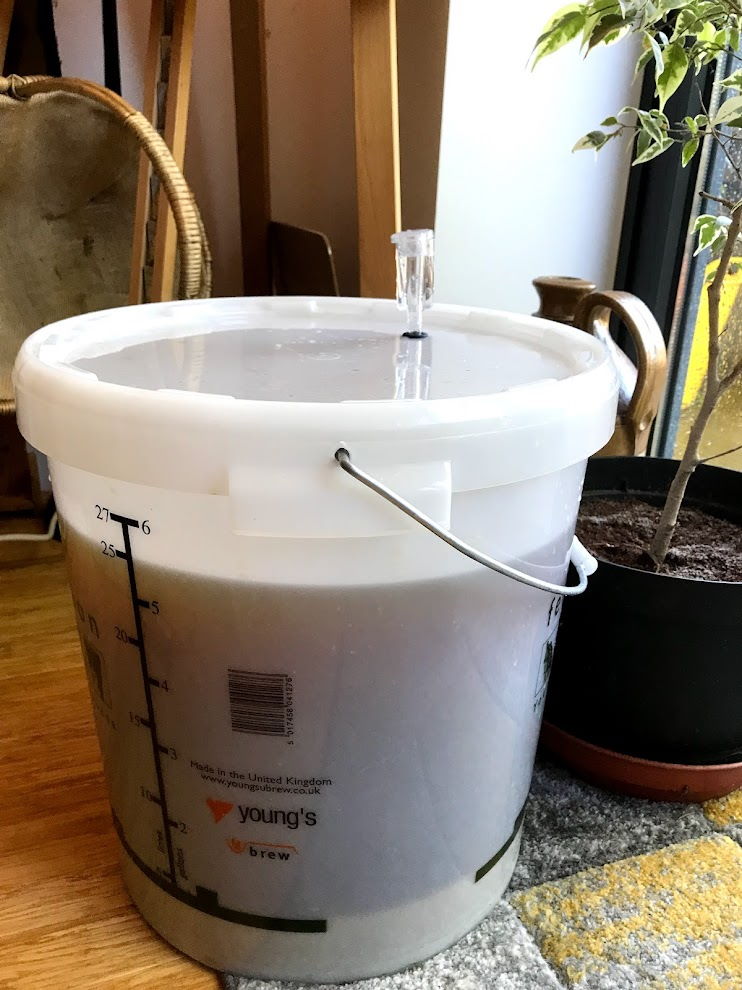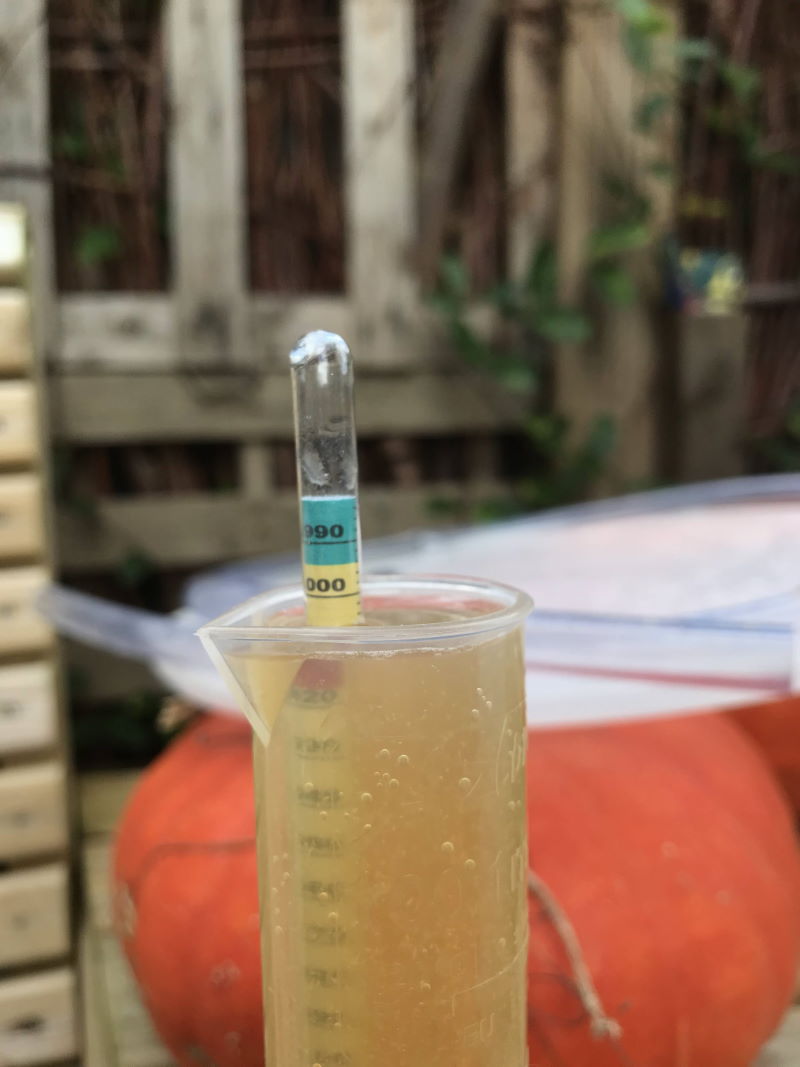Brew number 3 - it took 6 months!
https://www.themaltmiller.co.uk/product/belgian-blonde-leffe-clone/ ordered for around £26 (£19 + shipping) on 19th April 2021.
This is my first All Grain Mash brewing using Brew in a Bag technique. The first 2 brews I did were Malt Extract style
My new 50 litre cook pot (from ebay) and burner, regultor and hose.
after being expelled from the kitchen for breaking the cooker (see below). I am really thankful as it was pungent and lots of steam. I would not have been popular doing this in the family kitchen.
TL;DR
- Dingermans Pilsen Malt 5kg
- Dingermans Aromatic Malt 227g
- Dingermans Pale Wheat Malt 227g
- Strike Water - 33litres
- Strike Water temp - 66 (I got 65.5)
- Mash time - 90 minutes (Brew in a bag)
- Original Gravity - 1.065 (I got 1.050)
- Boil time - 90 minutes
- Hops - Hallertauer MittelFrush Pellets - added at 90minutes to go
- Candi rocks - added at 10 minutes to go
- Cooling - left overnight outside
- Final Batch size - 23litres (I’ve got 25litres including detrious)
- Yeast - T-58. Pitched at 16 degrees
- Fermentation - room temperature around 19 degrees
Intro
I found these videos useful:
https://www.youtube.com/watch?v=IneNZ4l6das - following this video
https://www.youtube.com/watch?v=SHV0k0pdtgc - and this Australian one
The Mash
Malted Grain + Hot water + time = wort
BOIB (brew in a bag) - mash and boil in same vessel instead of using a dedicated mash ton with a false bottom or screen
23 litre batch size
So it looks like about 33 litres may be a good starting amount of water (Strike Water). We’re using no sparge method ie we wont add any other water.
Heat water to about 70C (strike temperature). My mash temp is 66C
When target temp is met, turn off the burner
slowly pour the grain into the bag, stir, break up any clumps
this mixture of grain and hot water is now called the mash
aim for mash temp of 66
I got 65.5c with a 70c strike temperature, and it smelled really nice, almost sweet.
if too cool, heat up slowly if too hot, add cold water
when temp is good, cover the kettle and let the mash rest
rest mash for 90 minutes (my recipe) - enzymes now are breaking down complex starch into simple sugars that will be fermentable by brewers yeast
could stir a few times.. but not necessary
don’t worry about temp drop
mash out (optional) .. after 60 minutes or 10 minutes before end..heat back up to 78C and stir. which will get higher specific gravity as more sugars will come out.
Sparging (optional)
Rinsing the grains after the mash
Lautering
separating grain (grist) from liquid wort
lautering (lifting)
put bag out of kettle to let cool off (it will be hot)
transfer bag to a bucket… and any collected wort can be put back into the kettle
give bag a big squeeze.. (big gloves?)
The Boil
Take a gravity reading. 100ml sample. cool it, then hydrometer or a few drops on a refratometer. Mine was about 1035 (but wasn’t cooled when I did the reading) and recipe said original gravity should be 1065
Bittering hops at 90minutes (to go).. longer the hops are in, the more bitter, and less flavour
Add sugar at 10 minutes (to go!)
Flavour and aroma hops (none)
0 minutes is flame out
Finings - will help get clear wort
Chilling the wort
use immersion chiller to cool from boiling to pitching temperature
or put in a bucket and leave to chill overnight (I left it in the pot overnight)
The final specific gravity of around 1.050 at room temperature.
First Unsuccessful try
This pot was too big for my gas burner. It heated up the electrical clicker which then shorted out tripping the breaker. So the time has come to brew outside.
What you never want to see. The inside of a gas burner unit with fried electrics. With it all being my fault. Even though the engineers who have tried to fix it said it wasn’t my fault. It will always me my fault. Never argue with wife :-)
Grains Background info
https://www.themaltmiller.co.uk/product/dingemans-pilsen-malt/ - produced from the finest European two row barley - £2.28 / Kg
Malt is germinated cereal grain that has been dried in a process known as “malting”. The grain is made to germinate by soaking in water and is then halted from germinating further by drying with hot air.
We have 5Kg in this pack
Chepeast barley is £28 for 25Kg sack. £30 for 25Kg sack which is £1.20/Kg
Confusion is whether I need to ‘mash’ this. As it has already been malted.
Mashing Background info
https://byo.com/article/all-grain/
converts the starch in the grains to germentable sugars through activation on enzymes by heat.
Alpha amylase - best 67-75oC beta Amylase between 54-65oC
mill (crush) the grain so husk breaks open, giving water access the ge grain starches and enzymes
How water (also called hot liquor) is added to the masihng vessel, called a mash tun. So when mnised wiht the grain it is at a temperature that activates the enzymes.
Next the crushed grain is added and mised such that there ar eno clumps of grian.
Following this the mash is allowed to rest for an hour in order to gie the enzymes time to break apart the starches.
A single infusion mashin is most common in home brewing, where one temp is employed between 62 to 72oC activating both enzymes to varying degrees.
Following the mash rest, lautering beings. Lautering
Kids learning about beer making :-)
Fermentation
Lets leave it now (5th Oct at 0930) until fermentation stops.
Notice all the detrius (some of the grains escaped). I’ve left it all in there because I’m worried it wont be strong enough as Original Gravity was low, so trying to ferment all sugars possible.
Conditioning
I transferred to the keg on the 24th of October - 19 days after fermenting.
Took a final SG reading and it was 1010 OG was 1050
Final - Original * 131.25 = 5.25%
Looks like beer, and tasted good too. Tasted stronger than 5.25% to me.






